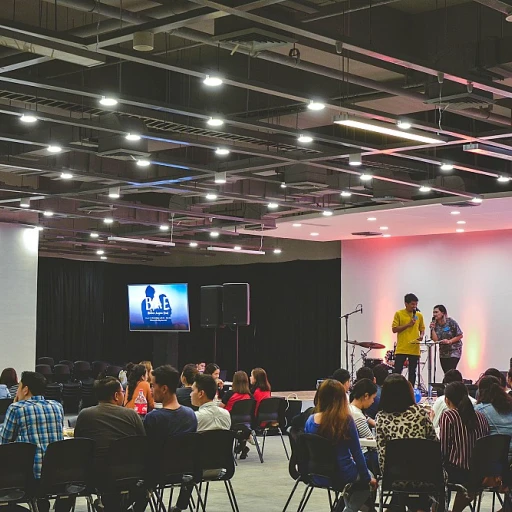
Understanding the Importance of Teacher Conferences
Recognizing the Crucial Role of Teacher Conferences
Teacher conferences have become a pivotal aspect of modern education systems. These events are not just formal gatherings; they are essential opportunities for schools to align with the needs of students and their families. Understanding the significance of such conferences is vital for all stakeholders involved, including school leaders, educators, and parents.
For teachers, these conferences are opportunities to share insights into a child's progress and discuss potential areas for improvement. Parents, on the other hand, gain insights that can help them support their child's learning journey. Conferences provide a comprehensive overview of a student's social, emotional, and academic development, making them indispensable for fostering a successful parent-teacher partnership.
Moreover, teacher conferences serve as platforms for professional development. They enable educators to exchange ideas, discuss innovative teaching strategies, and better understand special and early childhood education needs. Such engagement ensures that teachers are well-equipped to address diverse student needs effectively.
In addition, these conferences have far-reaching effects on the school community. They bring together individuals from various facets of the educational ecosystem, including district authorities, parents, and educators, to collectively enhance the learning environment and provide a more supportive space for student development.
As you delve deeper into the principles of project management, you'll find these conferences can be organized effectively, improving the overall educational experience for all involved. This understanding not only helps in conducting smoother conferences but also enhances the overall efficacy of the school's educational agenda.
Project Management Principles in Education
Integrating Project Management in Educational Settings
Applying project management principles in the realm of education can significantly enhance the organization and execution of teacher conferences. These principles are not just for the corporate world; they can be effectively adapted to manage school-related events, ensuring a smooth and successful experience for all involved, from teachers to parents and students.
Project management techniques help in structuring tasks, allocating resources, and managing time efficiently. This structured approach can be particularly beneficial in organizing teacher conferences, where multiple stakeholders such as school leaders, educators, and families need to be coordinated. By adopting these techniques, schools can better support teachers and parents in their shared goal of fostering student progress.
Applying Key Project Management Techniques
Some key project management techniques that can be applied to educational settings include:
- Task Breakdown: Dividing the conference planning process into smaller, manageable tasks helps in streamlining efforts and ensuring that nothing is overlooked. This is crucial in managing the various aspects of a teacher conference, from scheduling to resource allocation.
- Resource Allocation: Efficient use of resources, including time, personnel, and materials, is essential. Schools must ensure that they have the necessary support to conduct successful conferences, which may include arranging for translators for English language learners or special education specialists.
- Time Management: Scheduling is a critical component. Conferences should be planned to accommodate the availability of teachers, parents, and students. Proper time management ensures that all parties can participate fully without conflicts.
- Stakeholder Engagement: Engaging all stakeholders, including teachers, parents, and students, early in the planning process helps in addressing their needs and expectations, leading to more successful outcomes.
By integrating these project management techniques, schools can create an environment that supports effective communication and collaboration among all participants. This approach not only enhances the conference experience but also contributes to the overall goal of improving educational outcomes for students. For more insights on how these techniques are shaping management strategies, consider exploring emerging trends in IT services consulting.
Setting Clear Objectives and Goals
Defining Purpose and Targets for Educational Success
In organizing successful teacher conferences, setting clear objectives and goals is crucial. This process begins with understanding the primary purpose of the conference. Is it to discuss student progress, enhance parent-teacher communication, or perhaps to delve into specific areas such as special education or social emotional learning? Defining these purposes helps in aligning the conference's activities and discussions with the overall educational goals of the school or school district.
For schools, clear objectives ensure that all stakeholders, including teachers, parents, and school leaders, are on the same page. This alignment is essential for fostering a supportive environment where educators and families work together to support the child's learning journey. For instance, a national conference might focus on professional development for teachers, while a parent-teacher conference could aim to address individual student needs and help parents understand how they can support their child's education at home.
Establishing Measurable Outcomes
Once the purpose is defined, it is vital to establish measurable outcomes. These outcomes should be specific, attainable, and relevant to the conference's goals. For example, a successful parent-teacher conference might aim to ensure that parents leave with a clear understanding of their child's academic progress and strategies to help their child succeed. In contrast, an annual conference might focus on broader educational trends and strategies for school improvement.
Setting these outcomes not only provides a clear roadmap for the conference but also helps in evaluating its success. By having measurable targets, educators can assess whether the conference met its goals and identify areas for improvement in future events. This approach aligns with project management principles, ensuring that every aspect of the conference is purposeful and contributes to the broader educational objectives.
For more insights into how project management principles can enhance educational initiatives, consider exploring this comprehensive guide on recruiting strategies, which shares valuable parallels in setting clear objectives and achieving desired outcomes.
Effective Planning and Resource Allocation
Strategizing for Efficient Deployment of Resources
In the realm of education, organizing a successful teacher conference relies significantly on effective planning and resource allocation. The crux is not just about what you have at your disposal but how creatively and strategically you use those resources to maximize impact. Effective planning involves several layers and considerations:- Identifying Resources Needed: Determine what resources such as venue, technology, and materials are required for the conference. Schools must consider factors like the number of attendees, ranging from teachers, parents, and even students in some cases.
- Allocating Budget Wisely: Budgeting for a conference necessitates a thorough evaluation of costs, including those for venue, promotional materials, technology, and even refreshments. It's essential for school leaders to prioritize based on the objectives set earlier in the planning stage.
- Timing and Scheduling: Allocating time efficiently is key. Teachers and parents have busy schedules, so it's crucial to plan conferences at times that cater to the convenience of all stakeholders. Early childhood educators might find mornings preferable, while early afternoons may suit high school teachers and parents better.
- Leveraging Community Support: Schools can benefit greatly from engaging local community resources. This could involve seeking volunteer support from parents or partnerships with local businesses that might provide sponsorship or in-kind donations.
Engaging Stakeholders and Facilitating Communication
Collaborative Engagement and Communication Channels
Effective engagement with stakeholders is paramount in organizing successful teacher conferences. This process begins long before the conference itself. From school leaders to parents and the educators themselves, creating open lines of communication ensures every party is informed and involved.
To begin, schools should engage educators early, incorporating their valuable insights into planning and decision-making. Teachers are crucial in shaping the conference's objectives, paralleling the principles of setting clear objectives and goals discussed earlier. Their professional development needs and insights into student learning can help tailor a program that addresses both educational and social emotional growth.
For interacting with parents, schools can utilize various communication channels to touch base regularly. This ensures that families stay in the loop about the upcoming conference. Scheduling regular updates can also help engage parents who may otherwise be too occupied with their daily routines. Social media, newsletters, and emails are effective platforms to keep the parent community engaged and informed.
Furthermore, incorporating tools like agendas and event summaries can elucidate what families and students should expect. By clearly setting expectations, parents are better prepared to attend school events, ensuring a successful parent involvement. As outlined in earlier sections, planning effectively with resource allocation is key.
To further support engagement, offering different session formats can be beneficial to accommodate various topics ranging from special education to national conference insights. It’s essential to facilitate conversations that foster a partnership between child teacher, teacher parent, and school district, reinforcing the shared objective of enhancing child progress.
Ultimately, encouraging stakeholder feedback post-conference can be invaluable. It not only helps refine future sessions but also echoes the importance of evaluating success, a theme addressed in the subsequent section. By nurturing a two-way communication system, school conferences can truly thrive as a tool for enhanced education and learning.
Evaluating Success and Implementing Feedback
Measuring the Impact and Embracing Continuous Improvement
Evaluating the success of teacher conferences is a critical step that allows educators and school leaders to understand their effectiveness in fostering positive learning environments and student progress. An effective evaluation process helps in identifying strengths and areas for improvement, thereby enhancing future conferences' outcomes. A comprehensive evaluation of these educational events starts with gathering feedback from vital stakeholders, including teachers, parents, and school administration. Surveys and feedback forms can be used to collect insights on what aspects worked well and what areas needed more attention. Encouraging open communication during and after the conferences not only helps in gathering honest feedback but also strengthens the overall parent-teacher partnership. To ensure a robust evaluation process, consider these strategies:- Set Qualitative and Quantitative Metrics: Use a blend of both qualitative observations and quantitative data to assess conference success. For example, how many parents and teachers participated? How did the students and families perceive the value of the conference?
- Incorporate Social Emotional and Special Education Needs: Ensure evaluations consider how well the conference addressed the diverse needs of students, including social-emotional and special education requirements.
- Feedback from Students: Although the primary audience might be teachers and parents, gaining insights on students' perspectives post-conference can help educators tailor their approaches to better support student learning.
- Evaluate Support Structures Provided: Assess the support and resources made available to both parents and teachers. Did the conferences provide adequate support for parents to help with their child's education at home? Did teachers receive professional development opportunities to enhance their skills?












